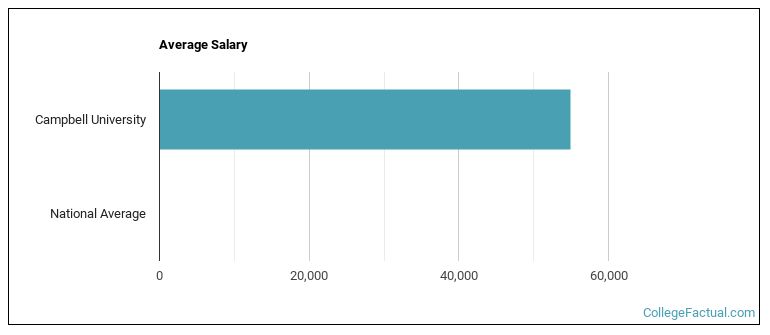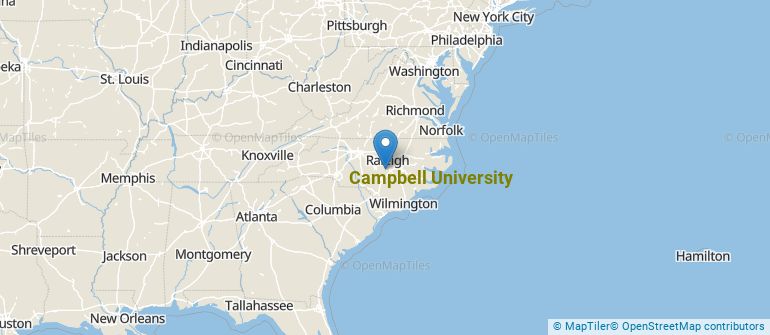 by our College Data Analytics Team
by our College Data Analytics TeamIn its yearly rankings, College Factual analyzes over 2,000 colleges and universities to determine which ones are the best in a variety of categories, such as overall value, quality, diversity, which schools are the best for each major, and much more.
Campbell University was awarded 2 badges in the 2025 rankings. The highest ranked major at the school is education.
Explore the best ranked schools for the programs you are most interested in.
Campbell landed the #1,496 spot in College Factual's 2025 ranking of best overall colleges in the United States. The higher ed experts analyzed 2,152 colleges and universities across the nation to determine this ranking.
Campbell is also ranked #49 out of 93 schools in North Carolina.
With an acceptance rate of 89%, Campbell has a fairly liberal admissions policy. However, don't just assume you'll get in! Put together a good application and make sure you include all requested documents and materials.
The student to faculty ratio is often used to estimate how much interaction there is between professors and their students at a college or university. At Campbell University, this ratio is 13 to 1, which is on par with the national average of 15 to 1. That's not bad at all.
When estimating how much access students will have to their teachers, some people like to look at what percentage of faculty members are full time. This is because part-time teachers may not have as much time to spend on campus as their full-time counterparts.
The full-time faculty percentage at Campbell University is 47%. This is comparable to the national average of 47%.
The freshmen retention rate of 75% tells us that most first-year, full-time students like Campbell University enough to come back for another year. This is a fair bit higher than the national average of 68%. That's certainly something to check off in the good column about the school.
Students are considered to have graduated on time if they finish their studies within four years. At Campbell the on-time graduation rate of first-time, full-time students is 41%. That is great when compared to the national average of 33.3%
Find out more about the retention and graduation rates at Campbell University.
During the 2017-2018 academic year, there were 3,720 undergraduates at Campbell with 3,098 being full-time and 622 being part-time.
| $0-30 K | $30K-48K | $48-75 | $75-110K | $110K + |
|---|---|---|---|---|
| $19,337 | $20,455 | $20,899 | $26,197 | $31,342 |
The net price is calculated by adding tuition, room, board and other costs and subtracting financial aid.Note that the net price is typically less than the published for a school. For more information on the sticker price of Campbell, see our tuition and fees and room and board pages.
While almost two-thirds of students nationwide take out loans to pay for college, the percentage may be quite different for the school you plan on attending. At Campbell, approximately 52% of students took out student loans averaging $7,421 a year. That adds up to $29,684 over four years for those students.

See which majors at Campbell University make the most money.
Get more details about the location of Campbell University.

Contact details for Campbell are given below.
| Contact Details | |
|---|---|
| Address: | 143 Main Street, Buies Creek, NC 27506 |
| Phone: | 800-334-4111 |
| Website: | https://www.campbell.edu/ |
| Most Popular Majors | Bachelor’s Degrees | Average Salary of Graduates |
|---|---|---|
| Business Administration & Management | 165 | $43,106 |
| Law | 155 | NA |
| Medicine | 148 | NA |
| Pharmacy/Pharmaceutical Sciences | 137 | $54,919 |
| Health & Physical Education | 98 | $32,167 |
| General Psychology | 69 | $33,892 |
| General Biology | 63 | $35,579 |
| Finance & Financial Management | 57 | $60,445 |
| Allied Health Professions | 53 | NA |
| Nursing | 46 | $70,772 |
Online courses area a great option for busy, working students as well as for those who have scheduling conflicts and want to study on their own time. As time goes by, expect to see more and more online learning options become available.
In 2022-2023, 1,562 students took at least one online class at Campbell University. This is an increase from the 1,545 students who took online classes the previous year.
| Year | Took at Least One Online Class | Took All Classes Online |
|---|---|---|
| 2022-2023 | 1,562 | 730 |
| 2021-2022 | 1,545 | 715 |
| 2020-2021 | 1,014 | 641 |
| 2018-2019 | 1,274 | 627 |
If you’re considering Campbell University, here are some more schools you may be interested in knowing more about.
Curious on how these schools stack up against Campbell? Pit them head to head with College Combat, our free interactive tool that lets you compare college on the features that matter most to you!
Footnotes
*The racial-ethnic minorities count is calculated by taking the total number of students and subtracting white students, international students, and students whose race/ethnicity was unknown. This number is then divided by the total number of students at the school to obtain the racial-ethnic minorities percentage.
References
More about our data sources and methodologies.